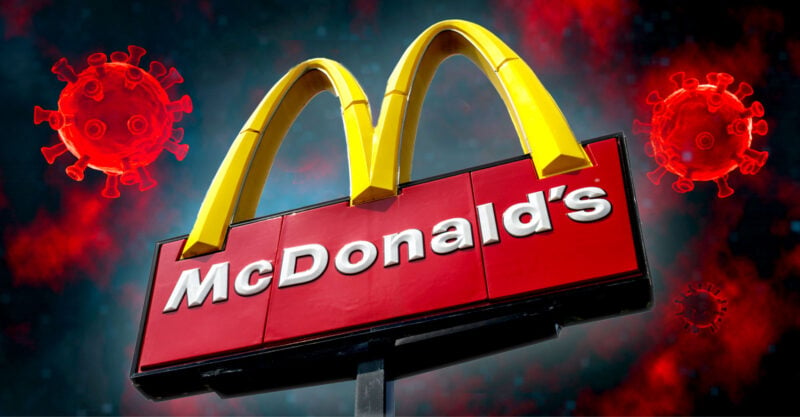
McDonald’s and “public health” don’t even belong in the same sentence, but this didn’t stop the US Department of Health and Human Services from enlisting the fast food giant to promote its Cvid-19 public health education campaign.
The US Department of Health and Human Services (HHS) enlisted McDonald’s to promote its Covid-19 public health education campaign.
McDonald’s produces and promotes some of the unhealthiest ultra-processed food on the planet – food that likely played a role in making Covid-19 outcomes worse. The joint initiative debuted in May 2021 and included the use of a McDonald’s billboard in Times Square to promote Covid-19 shots, and HHS promotional material on its hot McCafé cups and McDelivery seal stickers.
The packaging includes imaging and text promoting HHS’ We Can Do This initiative, which is intended to “increase confidence in Covid-19 vaccines and reinforce basic prevention measures.”
By naming McDonald’s and other junk food giants as partners in the fight against a pandemic, health officials further normalised the consumption of foods that lead to chronic disease and premature death.
McDonald’s and “public health” don’t even belong in the same sentence, but this didn’t stop the HHS from enlisting the fast-food giant to promote its Covid-19 public health education campaign.
HHS, whose stated goal is to “enhance the health and well-being of all Americans,” partnered not with a health food company, fitness outlet or even a hospital or medical facility but, rather, McDonald’s, which produces and promotes some of the unhealthiest ultra-processed food on the planet – food that likely played a role in making Covid-19 outcomes worse.
Nonetheless, it was positioned as a tool for public health and used as part of the widespread propaganda to get more people injected with Covid-19 shots.
In 2021, the Biden Administration called for Covid-19 “misinformants,” including yours truly, to be removed from all social media platforms, censoring the ability to provide useful and truthful Covid-19 information.
The irony of the Biden Administration then partnering, that same year, with McDonald’s to “provide trusted, independent information on Covid-19 vaccines” is palpable.
The joint initiative debuted in May 2021 and included the use of a McDonald’s billboard in Times Square to promote Covid-19 shots. That July, McDonald’s added promotional material leading customers to vaccines.gov to its hot McCafé cups and McDelivery seal stickers.
The packaging includes imaging and text promoting HHS’ We Can Do This initiative, which is intended to “increase confidence in Covid-19 vaccines and reinforce basic prevention measures.”
Included prominently on its We Can Do This webpage are recommendations on Covid-19 shots for young children and tools to address “vaccine misconceptions,” including premade graphics to share on social media and a community toolkit to shut down “misinformation.”
In a press release, McDonald’s proudly promoted its new role as a public health educator:
“The initiative will begin … with the debut of Covid-19 vaccine information from trusted third parties on McDonald’s billboard in Times Square. Starting in July, McDonald’s hot McCafé® cups and McDelivery® seal stickers will lead customers to vaccines.gov, where they can learn more about how they can protect themselves and the people they love from Covid-19, as well as where to find vaccine appointments near them.
“The new packaging and ads feature art from the national We Can Do This campaign, setting the campaign’s slogan against a map of the United States. McDonald’s is committed to making helpful information accessible to our customers, who are encouraged to share the campaign using #WeCanDoThis to inspire others to learn more about what they can do to help end the pandemic.”
Researchers with the University of São Paulo in Brazil found that about 57,000 premature deaths in the country were due to the consumption of ultra-processed foods, which amounted to 10.5 per cent of all-cause premature deaths, among adults aged 30 to 69. In Brazilian adults, ultra-processed foods make up 13 per cent to 21 per cent of total energy intake.
But among Americans, ultra-processed foods make up about 57 per cent of daily calories, on average, leading the researchers to suggest premature deaths linked to the foods are likely even greater in the US
In Brazil, meanwhile, the study found that if the contribution of ultra-processed foods to total caloric intake was reduced by 10 per cent to 50 per cent, anywhere from 5,900 to 29,300 deaths could be prevented, annually.
Further, the researchers estimated that if ultra-processed foods made up less than 23 per cent of adults’ daily calories, about 20,000 premature deaths could be prevented each year.
Meanwhile, we have HHS in the US using McDonald’s to promote its public health propaganda.
In case you needed more reason to avoid ultra-processed foods, even if HHS suggests otherwise, researchers from Imperial College London’s School of Public Health found these cheap convenience foods are linked to an increased risk of developing and dying from cancer.
Overall, consuming more ultra-processed foods was linked with a greater risk of developing any cancer, as well as ovarian and brain cancers specifically. In another study, men who consumed the most ultra-processed foods had a 29 per cent higher risk of developing colorectal cancer than those who consumed the least.
The health risks of ultra-processed foods are so concerning that Kiara Chang of Imperial College London’s School of Public Health called for “clear front of pack” warning labels to be added to their packaging so consumers can make informed dietary decisions but that would require taking up valuable advertising space from HHS.
- A Tell / The Defender report / By Dr Joseph Mercola, the founder of Mercola.com











